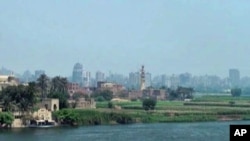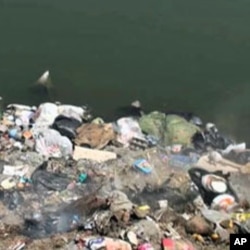This is Part 4 of a 5-part series: Sharing the Nile's Waters
Parts 1 / 2 / 3 / 4 / 5
The countries along the Nile have been at odds recently over how to share its waters. But beyond the issue of quantity is the question of quality, and how well states use what they have.
Egyptians are fond of saying that without the Nile, there wouldn't be an Egypt. The river provides some 95 percent of the country's water and, for thousands of years, an intricate series of canals and irrigation channels have turned the desert along its banks into farmable and now densely-populated land.
The only problem is that Nile water is unclean. "Water is a basic right for every human being and, once we all agree that it is a basic right, we all should work to providing this basic right in a decent way. I mean better quality, good quantity and so on," said Mahmoud Abu Zeid, president of the Arab Water Council and a former minister of water.
He says both industrial pollution and agricultural run-off harm the quality of Nile water. But the most pressing issue, he says, is the wholesale dumping of human waste.
In the cities, only 60 percent of human waste enters a sewage system. In the villages, less than 40. Dirty water is blamed for the deaths of about 17,000 children a year from dysentery alone. The chlorination system can break down or people actually drink from the Nile.
One of Egypt's rivals for Nile waters is Ethiopia. Ayman Shabana, professor of African Affairs at Cairo University, says the situation there is even worse.
"Ethiopia has abundant water, but 76 percent of its population lack fresh water or clean water for one main reason - not its shortage, but to due to bad administration and the lack of financial resources," said Shabana.
Poor governance and insufficient funds in the Nile states seem to be at the core of the problem. Sewage systems are expensive and are just one of many infrastructure projects needed. Officials say international aid has helped, but falls short.
Abu Zeid says one short-term way to improve quality is tied to quantity. "The river is more than 6000 kilometers long. If we have some pollution in the upper areas, by the time it gets here, this quality will be improved a little bit," he said.
Which means if less water is wasted along the way, the larger volume will help dilute pathogens and pollutants.
Authorities in Egypt are not optimistic. "We have a lot to do, to accomplish," said Mahmoud Abu Zeid. "And until we accomplish that, in fact, it will take actually about 20 years for Egypt. So we'll suffer the deterioration of the quality of both the canal[s] and the river and drainage system, too."
The government is trying to raise awareness about water use and pollution. But until it can build enough waste-disposal infrastructure, the Nile will continue to hold the promise of life, just not a clean one.





